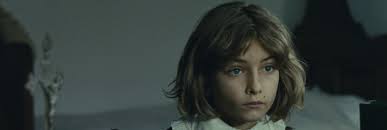THE CHILDHOOD OF A LEADER
This is out on DVD now, I discovered it in Sainsbury’s, the cast staring balefully out at me from the cover and seeming to condemn me for my lack of professionalism in not getting round to review this back in September 2016, when I originally saw it at the ICA. Of course I’m not a professional, I’ve said this before, and luckily we seem to be entering the age of the enthusiastic amateur, eg. Donald Trump.
The American Brady Corbet, who directed it, is himself better known as an actor. Of late he seems to have been backpacking through European art movies, popping up in Ruben Ostlund’s Force Majeure and Olivier Assayas’ Clouds of Sils Maria, so perhaps it’s no surprise that he ended up directing one of his own. It’s good too – an absorbing depiction of the privations of the rich and powerful, the lacks and losses that shape their lives.
Transplanted from America to France, where his father is a politician helping to carve up Europe post-WW1, our boy hero, Prescott (Tom Sweet) is deprived first of his natural setting and then of the closest thing he has to love, when the one person in the household to show him any natural affection – the housekeeper – is fired for that very reason. Dad (Liam Cunningham) is not what you’d call affectionate, possibly because he is not our hero’s real father, and Mum (Bérénice Bejo) is generally laid up with one of her headaches.
The only thing he has to call his own is his abundant golden hair, and that only causes people to mistake him for a girl. Nevertheless, we understand why he refuses to get it cut. Oppressed by the dismal grey landscape he soon resorts to throwing stones and becoming generally anti-social, before finally declaring his estrangement from God, scandalising a dinner party by repeatedly yelling that he ‘doesn’t believe in praying anymore’.
At the end we leap into the future, or into some sort of parallel universe, where our hero has shaved his head, looks suspiciously like his Mum’s friend Charles (Robert Pattinson, in both cases) and is the leader of what seems to be a fascist state.
But we barely get a chance to comprehend this situation before the camera starts whirling madly around, as if Corbet were an artist sabotaging his own canvas with turpentine. I have to say I don’t know what’s going on here – maybe we are seeing this alternative reality crumble in the face of a more immediate one, the rise of another putative dictator with a hair issue and a tendency to throw tantrums.
But if this oblique final section left me a little bemused, mainly I found Corbet’s film gripping and atmospheric. Scott Walker’s driving music, which seems to be scoring the fascist nightmare that the film only implies, is worth owning in its own right, and may well provide a fitting soundtrack to wherever it is we’re heading now.
THE STUDENT
At least I’m still ahead of the curve on this one, having seen it (Vue Leicester Square) at the London Film Festival – it comes out in March. In this Russian film – based on Marius von Mayersburg’s (German) play – an adolescent, Venya (Petr Skvortsov) throws all his Weltschmerz into a suddenly-acquired enthusiasm for the Bible, which he quotes obsessively (the appropriate textual reference materialising – a bit irritatingly – onscreen whenever he does so).
Naturally it’s the more violent side of the good book – vengeance, blood, swords etc. – that excites his interest, plus his new obsession conveniently legitimizes his discomfort with sex, gay sex in particular.
Elena, a liberal biology teacher (Victoria Isakova) opposes him but her more traditional colleagues, less inclined to abstract thought, start to believe that he might have a point, and his interventions, rather than merely disrupting the routine of the school, begin to set the agenda.
This is not a nuanced opposition of differing worldviews, and is fairly and squarely aimed an an audience who share Elena’s view that religion is ‘a fairy story’. What complicates the situation, and helps to make Kirill Serebrennikov’s film a vital and compelling piece of work, is Venya himself. Energetically played by Skvortsov, he is less a spectre of oppressive traditionalism than an anarchic – and to some degree charismatic – force: demonic, you might even say. He protests against sex education by stripping naked in class, and expresses his stance on evolution by capering around in a gorilla suit. You can imagine that a certain kind of audience would see him as a hero, especially in the Rocky-esque sequence where he lugs a huge wooden cross he’s made across town to the strains of Laibach doing God Is God.
The choice of music is significant, Laibach being arty pranksters rather than true Christian believers. I must say that initially I thought that this film would have had more relevance if the religion in question had been Islam rather than Christianity – but the relevance lies less in the embracing of religion than in the denial of rationality. The film ends with our heroine nailing her shoes to the floor, having been driven to distraction by her increasingly monstrous pupil, leaving us to wonder: is clinging to a rational worldview under these circumstances a kind of madness in itself? Discuss.


Recent Comments